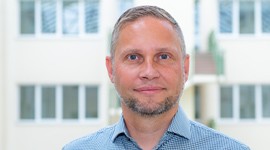Collaboration between Fraunhofer IZI and Halle University Hospital to develop therapeutic antibodies for HERV-associated autoimmune and tumor diseases
Human endogenous retroviruses (HERVs) and, more specifically, their envelope proteins are suspected of transporting diseases such as multiple sclerosis, rheumatism and tumor diseases. However, the actual function of these specific factors remains to be seen. Cellular damage and the misdirected stimulation of the immune system caused by HERV are assumed to be disease mechanisms. A joint research project between the Fraunhofer Institute for Cell Therapy and Immunology IZI and Halle University Hospital is expected to deliver new insights based on the characterization of HERV envelope proteins. The aim is to develop therapeutic antibodies for HERV-associated autoimmune and tumor diseases.
At least eight per cent of today’s human genome is made up of human endogenous retroviruses. These are traced back to viral DNA which has found its way into the human genetic makeup through germ line infections over the course of evolution. Mutations have made the majority of these HERVs non-functional. Sequences do, however, exist that enable the generation of viral transcripts and proteins in humans.
Head of the Molecular Biotechnology Unit Dr. Holger Cynis is working on this topic at Fraunhofer IZI and described the project as follows: “We want to use genetic and protein expression analyses to identify HERV envelope proteins that may serve as candidates for the development of therapeutic antibodies. We use all kinds of analytical techniques here as well as the MALDI imaging procedure. This type of imaging mass spectrometry enables us to create profiles of proteins in the tissue and thus identify marker proteins.”
Professor Martin S. Staege from Halle University Hospital, who has been conducting HERV research for several years now, added: “In doing this, we also want to find target structures we can use as antigens to then manufacture antibodies with therapeutic potential.” Staege is the head of the research laboratory at the University Hospital and Polyclinic for Pediatrics I and is involved in the project on behalf of the university hospital together with Dr. Alexander Emmer, consultant at the University Hospital and Polyclinic for Neurology.
As part of the research project, the Halle scientists will produce HERV envelope proteins using biotechnology and characterize their biological activity. These proteins will then also serve as antigens for generating both polyclonal and monoclonal antibodies. Finally, a suitable antibody is to be humanized, enabling it to be utilized in the human organism and in the development of therapies. The project is expected to pave the way for new therapeutic procedures to treat autoimmune and tumor diseases.
The project “Characterization of HERV envelope proteins aimed at developing therapeutic antibodies for HERV-associated autoimmune and tumor diseases” is being funded by the European Regional Development Fund (ERDF) and the State of Saxony-Anhalt. Fraunhofer IZI is receiving almost 500,000 euros and Halle University Hospital around 466,000 euros to fund the project over three years. The project forms part of the “Saxony-Anhalt SCIENCE – FOCUS” program, through which the State of Saxony-Anhalt supports specialist research activities and innovative research projects in the field of science.
In cooperation with: University Hospital Halle (Saale), Germany

